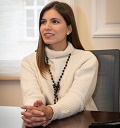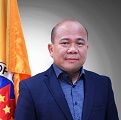|
Location: Media Studio - Blue Level, HQ1-B-640
There are currently huge disparities in broadband connectivity, which has been exacerbated by the pandemic, and is commonly referred to as the ‘digital divide’. There is significant variation across regions and countries depending on their level of development. Within countries, there is a large gap in internet usage in terms of individuals’ socio-economic status, urban versus rural location, gender and age.
 |
Mariano Moszoro Fiscal Affairs Department, IMF |
Mariano Moszoro a Senior Economist at the International Monetary Fund in Washington, DC. His work experience and research focus on Public Finance, Political Economy, and Infrastructure Development. In 2005-2006, he was Deputy Minister of Finance of Poland and Chairman of the state development bank BGK. Mariano holds a Ph.D. and habilitation (French HDR/US tenure equivalent) in Economics from SGH Warsaw School of Economics and interned as a post-doctoral fellow at UC Berkeley-Haas under Nobel laureate Oliver E. Williamson. He has published in top academic journals and held academic positions at Berkeley, Harvard, and GMU.
 |
María Lucía Villalba Gómez Presidential Advisor, Presidential Advisory Office for Digital Transformation, Management and Compliance |
María Lucía Villalba Gómez is an economist from the Pontificia Universidad Javeriana and holds a master's degree in International Affairs from New York University.
With more than 10 years of professional experience, mainly in the public sector, she has led the implementation of different economic and social development projects, as well as the formulation and implementation of public policies, mainly associated with digital transformation, international affairs, and the tourism sector.
She has served as Consul of Colombia in New York; as the Inter-institutional Director and then Vice President of Planning and Projects of the National Tourism Fund (Fontur) and as the Advisor to the Presidency of the Republic. During her early years, she was also linked to the National Planning Department.
She currently serves as the Presidential Advisor of the Presidential Advisory Office for Digital Transformation, Management and Compliance, where she leads important digital transformation projects for Colombia, as well as monitoring the priorities of the National Government, among which we highlight: the implementation of the Economy for the People program; the planting of 180 million trees; the Temporary Statute of Protection; the Digital Transformation of Justice; among others.
 |
Rolando U. Toledo Undersecretary of the Budget Policy and Strategy (BPS) Group of the Philippine Department of Budget and Management (DBM) |
Mr. Rolando U. Toledo is the Undersecretary of the Budget Policy and Strategy (BPS) Group of the Philippine Department of Budget and Management (DBM). He directly oversees the operations of the Budget Information and Training Service (BITS) and the Fiscal Planning and Reforms Bureau (FPRB) in its conduct of fiscal policy research and planning, development of fiscal and budgeting frameworks, formulation of annual and quarterly whole-of-government allotment and cash release programs, and monitoring of macroeconomic developments and their impact on the budget. He currently chairs the Executive Technical Board of the Development Budget Coordination Committee (DBCC) which reviews and approves the macroeconomic targets, revenue projections, borrowing level, aggregate budget level, and expenditure priorities of the country.
Undersecretary Toledo is also the concurrent Spokesperson of the Department and the Chair of the Government Procurement Policy Board (GPPB). As the Lead Secretariat for the Philippine Open Government Partnership (OGP) and the Participatory Governance Cluster (PGC), Undersecretary Toledo supervises the Department’s initiatives that promote fiscal transparency and participatory governance.
Relevant to the implementation of the Supreme Court ruling on the Mandanas-Garcia case, the Undersecretary has been designated as the Chair of the Sub-Committee on Communications Strategy. As such, he leads the discussions on how to address misinformation and to harmonize the collaboration of the national and local governments for the effective implementation of the Supreme Court ruling.
Mr. Toledo graduated from the University of the East in 1984, earning a Bachelor of Science degree in Business Administration. He became a Certified Public Accountant a year after, and took a Program in Development Economics from the University of the Philippines – School of Economics in 1994.
Khaled Sellami Director general at E-government Unit Tunisia |
Khaled SELLAMI is Chief engineer in Computer Engineering and Director General of the e-government Unit at the Presidency of the Government of Tunisia since January 2011. He is in charge of the implementation of the national e-government program in Tunisia and currently leading a working team on “Digitalization of government payments”.
He holds a B.S. degree in Computer Engineering from Syracuse University in 1984 and a M.S. degree in computer engineering from the University of Michigan in 1986.
He served between 1995 and 2010 as Director of studies at the Tunisian Institute for Strategic Studies and between 1987 and 1995 as project manager for wide area networks and Internet at the Regional Institute for Informatics and Telecommunications.
He led national efforts to join the Open Government Partnership initiative since 2012 and is acting as the focal point of this program in Tunisia.
He was elected in 2017 by the Tunisian Parliament as member of the council of the Authority for access to Information and is now serving as member of this council. Earlier, he served as member of the National Authority for Personnel Data Protection for six years.
In addition to his current responsibilities, Khaled Sellami is a lecturer at the National School of Administration on e-government and open government. He served as expert to UN agencies on open government and open data in the Middle East area. He also contributed to the
He was guest speaker in many national and international conferences in the area of e-government, open government, open data, e-participation and digital transformation. He also represented Tunisia in many meetings and international conferences, and is a permanent member of the MENA-OECD working group on open and innovative government.
 |
Paula Ingabire Minister of ICT and Innovation, Government of Rwanda |
Paula Ingabire is a Rwandan technology enthusiast, who currently serves as the Minister of ICT and Innovation in the Government of Rwanda. Prior to her appointment as Minister, she served as Head of the ICT Business Development Department at the Rwanda Development Board (RDB) where she led the implementation of National ICT programs notably eGovernment and Cyber Security; as well as the coordinator of the Kigali Innovation City Project, a flagship program of the Government designed to nurture and strengthen a Pan-African Innovation eco-system in Rwanda.
Minister Ingabire coordinated the creation of Smart Africa, an initiative that seeks to leverage broadband infrastructure as a driver for Africa’s socio- economic growth.
A graduate of the Massachusetts Institute of Technology’s School of Engineering & Sloan School of Management, in the System Design and Management program and holds a BS in Computer Engineering and Information Technology from the University of Rwanda; Paula was named in 2019 by Apolitical among the Top 20 of the World’s 100 most influential people in digital government. She serves on the Global Council of the World Summit Award Board of Directors, World Economic Forum Cyber Security Board, the Centre for the Fourth Industrial Revolution Global Network Advisory Board and the WEF Board of Trustees. In January 2021, Paula Ingabire has been named founding board member of the EDISON Alliance.
 |
Ruud De Mooij Fiscal Affairs Department, IMF |
Ruud De Mooij is an assistant director in the International Monetary Fund’s Fiscal Affairs Department, where he previously headed the Tax Policy Division. He has extensive experience in providing capacity development on tax policy issues in over 25 countries, including on medium-term revenue strategies. Before joining the International Monetary Fund, De Mooij was a Professor of Public Economics at Erasmus University in Rotterdam. He has published extensively on tax issues, including in the American Economic Review and the Journal of Public Economics. De Mooij is also a research fellow at the University of Oxford, the University of Bergen, ZEW in Mannheim, and member of the CESifo network in Munich.